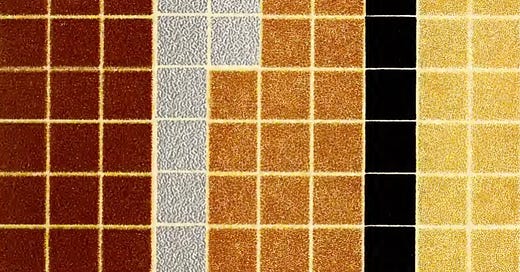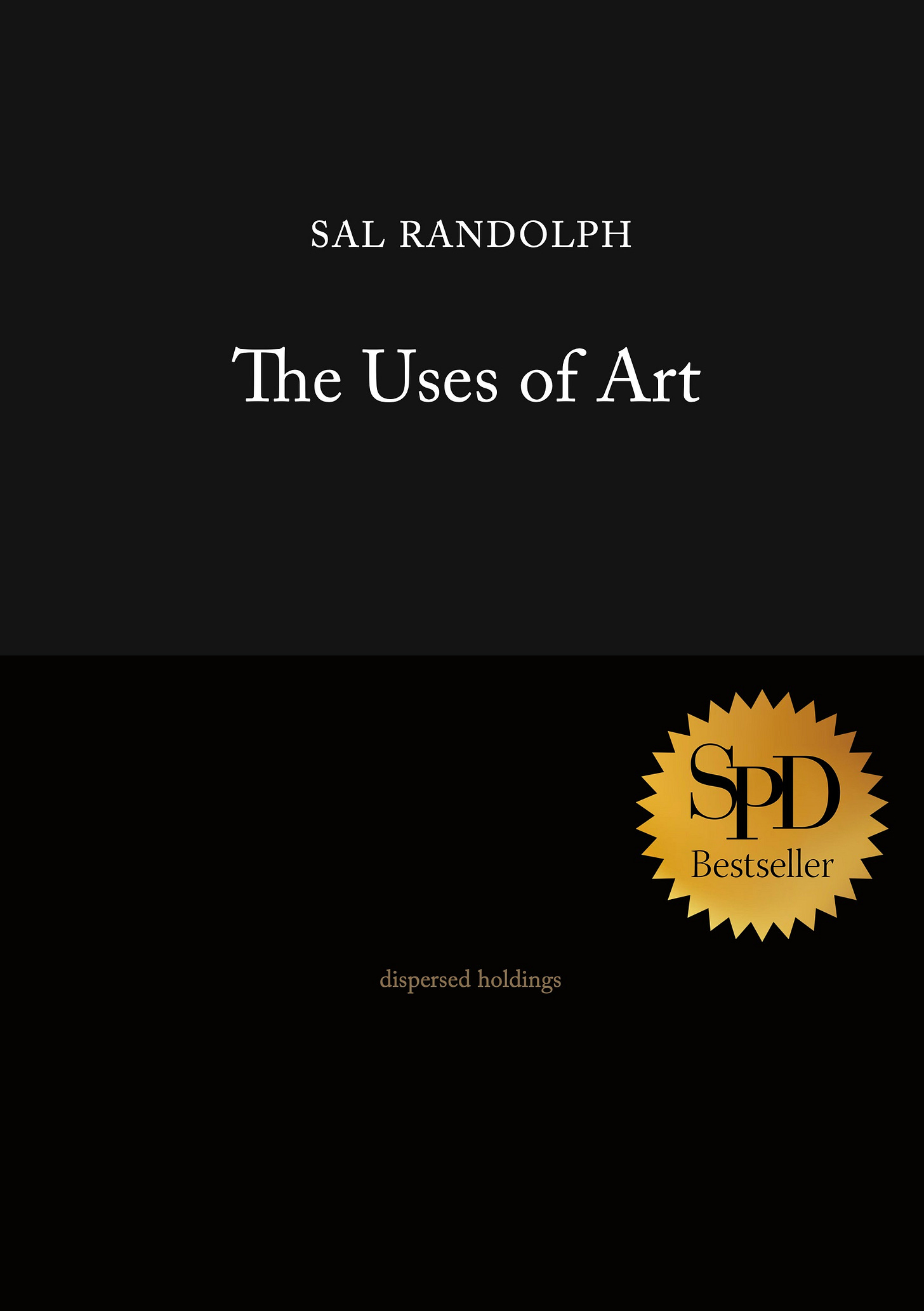
Dear Friends,
Whenever I find myself falling out of love with New York, or with life (virtually the same thing), I slip a copy of Frank O’Hara’s Lunch Poems into my back pocket. Waiting on a subway platform or pausing for a cup of coffee, I’ll pull it out and the line I need is always right there.
With O’Hara’s poems in my pocket even New York’s hottest days are imbued with what he calls a “luminous humidity.” The city’s dirt becomes beautiful. “Does it just seem dirty / that's what you think of in the city / you don't refuse to breathe do you,” he asks. And it’s a city of lovers: “in the warm New York 4 o’clock light we are drifting back and forth between each other like a tree breathing through its spectacles.”
Frank O’Hara’s New York extends beyond the confines of the physical city—it includes Paris, Barcelona, Hollywood, Long Island, trains, books, music, movies, paintings, newspaper headlines and the names of countless friends. No matter how far away anyone or anything is, it’s right there. “My heart is in my pocket, it is Poems by Pierre Reverdy.”
As I’m walking down the sidewalk, I often think of O’Hara saying: “One need never leave the confines of New York to get all the greenery one wishes—I can’t even enjoy a blade of grass unless I know there’s a subway handy, or a record store or some other sign that people do not totally regret life.”
— Sal
Lunch Poems
Let’s look over the shoulder of a young Frank O’Hara on his lunch hour, stepping out into the city from his day job at the Museum of Modern Art. Maybe it’s 1959, maybe it’s 1960. He lights up a cigarette and walks a couple of blocks to the Olivetti showroom on Fifth Avenue. There, he pauses to finish his cigarette and types out a quick poem on the sample typewriter bolted to a stand out on the sidewalk.
What is he typing?
Adieu to Norman, Bon Jour to Joan and Jean-Paul
It is 12:10 in New York and I am wondering
if I will finish this in time to meet Norman for lunch
ah lunch! I think I am going crazy
what with my terrible hangover and the weekend coming up
at excitement-prone Kenneth Koch's
I wish I were staying in town and working on my poems
at Joan's studio for a new book by Grove Press
which they will probably not print
but it is good to be several floors up in the dead of night
wondering whether you are any good or not
and the only decision you can make is that you did it
yesterday I looked up the rue Frémicourt on a map
and was happy to find it like a bird
flying over Paris et ses environs
which unfortunately did not include Seine-et-Oise
which I don't know
as well as a number of other things
and Allen is back talking about god a lot
and Peter is back not talking very much
and Joe has a cold and is not coming to Kenneth's
although he is coming to lunch with Norman
I suspect he is making a distinction
well, who isn't
I wish I were reeling around Paris
instead of reeling around New York
I wish I weren't reeling at all
it is Spring the ice has melted the Ricard is being poured
we are all happy and young and toothless
it is the same as old age
the only thing to do is simply continue
is that simple
yes, it is simple because it is the only thing to do
can you do it
yes, you can because it is the only thing to do
blue light over the Bois de Boulogne it continues
the Seine continues
the Louvre stays open it continues it hardly closes at all
the Bar Américain continues to be French
de Gaulle continues to be Algerian as does Camus
Shirley Goldfarb continues to be Shirley Goldfarb
and Jane Hazan continues to be Jane Freilicher (I think!)
and Irving Sandler continues to be the balayeur des artistes
and so do I (sometimes I think I'm "in love" with painting)
and surely the Piscine Deligny continues to have water in it
and the Flore continues to have tables and newspapers
and people under them
and surely we shall not continue to be unhappy
we shall be happy
but we shall continue to be ourselves everything
continues to be possible
René Char, Pierre Reverdy, Samuel Beckett it is possible isn't it
I love Reverdy for saying yes, though I don't believe it
Personal Poem
Now when I walk around at lunchtime I have only two charms in my pocket an old Roman coin Mike Kanemitsu gave me and a bolt-head that broke off a packing case when I was in Madrid the others never brought me too much luck though they did help keep me in New York against coercion but now I'm happy for a time and interested I walk through the luminous humidity passing the House of Seagram with its wet and its loungers and the construction to the left that closed the sidewalk if I ever get to be a construction worker I'd like to have a silver hat please and get to Moriarty's where I wait for LeRoi and hear who wants to be a mover and shaker the last five years my batting average is .016 that's that, and LeRoi comes in and tells me Miles Davis was clubbed 12 times last night outside birdland by a cop a lady asks us for a nickel for a terrible disease but we don't give her one we don't like terrible diseases, then we go eat some fish and some ale it's cool but crowded we don't like Lionel Trilling we decide, we like Don Allen we don't like Henry James so much we like Herman Melville we don't want to be in the poets' walk in San Francisco even we just want to be rich and walk on girders in our silver hats I wonder if one person out of the 8,000,000 is thinking of me as I shake hands with LeRoi and buy a strap for my wristwatch and go back to work happy at the thought possibly so
O’Hara reading from Lunch Poems in 1966.
O’Hara reading “Having a Coke With You.”
Frank O’Hara reading at SUNY in 1964
You can also listen to a longer reading Frank O’Hara gave at SUNY in 1964, which includes several lunch poems.
Exercise: Find Your New York
Don't be bored, don't be lazy, don't be trivial, and don't be proud. The slightest loss of attention leads to death. - Frank O'Hara
Choose an object for your attention. This could be a painting or another work of art, it could be a book you are reading, it could be the room you are in or the glass you are drinking from. Whatever the object of your attention is, let’s call it New York.
Walk around in your New York. Take note of what you see, of what you’re doing right now, of where you’re going next. You’re in love! In love with the city as much as anything else. You’re in the middle of your ordinary-extraordinary day.
After you’ve spent some time in your New York (wherever or whatever it is), take 10 minutes to write down everything that happened. If you have a typewriter handy, so much the better.
Name the street corners, the friends who you are thinking of, the time of day, the movie you might go to, the book in your pocket, the headline you just read. Expand this out to everything that isn’t happening right now, but occupies your dreams and your imagination; bring it all into the present moment.
If you want to keep going, try out this recipe for writing a New York School poem by poet Thom Donovan.
As with all of these “Ways of Seeing,” the initiating impulse is to expand our possibilities for engaging with works of art and deepening attention to everything around us. These exercises are perfect for time spent in museums, galleries, and studios. You can also bring them into the rest of your life and experiment with streets, libraries, parties, landscapes. Try them as writing or art-making prompts.
These practices work best if you give them some time.
As ever, interpret these instructions freely and intuitively. Make them your own.
The title Ways of Seeing is an homage to the continuing inspiration of the BBC TV series and book by John Berger.
Frank O’Hara
Frank O’Hara’s Lunch Poems
Frank O’Hara’s Lunch Poems is available from City Lights.
The Collected Poems of Frank O’Hara
The Collected Poems of Frank O’Hara is available from the University of California Press.
Many more Frank O’Hara poems at the Poetry Foundation.
Where is your New York? I’d love to hear!
Further adventures and new ways of seeing can be found in my book, The Uses of Art.
Artist Sal Randolph’s THE USES OF ART is a memoir of transformative encounters with works of art, inviting readers into new methods of looking that are both liberating and emboldening.
Dazzlingly original, ferociously intelligent.
— Michael Cunningham
A joyful, dazzling treasure-box of a book.
— Bonnie Friedman
Here’s a guide, to waking up, over and over again.
— Roshi Pat Enkyo O’Hara








Hey Sal, I love Frank O'Hara! For so many reasons, which right now I don't have time to even begin to list. But I just want to very briefly reminisce about that weekend many moons ago when the two of us spent a couple of ordinary-extraordinary days walking around all over Frankfurt, Germany, using the map of New York City, visiting a series of specific addresses in Manhattan and Brooklyn, and always finding exactly what we were looking for. Do these precious memories qualify? (One day I really will write them all down, using a typewriter, or at least a typewriter font ...)
a lovely meditation on how heritage artists can inspire us to create and be inspired